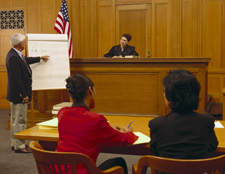Aviso de archivo
Esta es una página de archivo que ya no se actualiza. Puede contener información desactualizada y es posible que los enlaces ya no funcionen como se pretendía originalmente.
Home | Glossary | Resources | Help | Contact Us | Course Map
Presentation skills are difficult for an analyst to master. The ability to balance the highly technical field of expertise while ensuring the jury comprehends the content is not as easy as one would initially think. It is easy for the testimony to become overly technical and scientific, well beyond the grasp of the jury's ability to understand. Conversely, it is equally easy to oversimplify the subject matter and become condescending or insulting to the jury. Witnesses should remember to enunciate clearly and loudly enough to be heard by the jury. Always check with the attorney to get an idea of the jury composition and education level. Remember that the most precise, technically correct, and jargon-laden statement doesn't mean anything if the jury doesn't understand it correctly. The analyst should double check any materials that they expect to use in their presentation for accuracy and clarity.
See the YouTube Terms of Service and Google Privacy Policy
Conclusions
The ability to communicate effectively in court can be difficult and intimidating, yet it is a critical aspect of the analyst's responsibilities. Of equal importance is remaining objective and professional during the process of giving testimony. Properly preparing for court is an obligation that will result not only in the analyst's ability to give accurate testimony, but will also deflect the efforts of an aggressive attorney. Professionalism, competency, objectivity, and integrity are the landmark components to effective courtroom testimony. Shortcomings in any of these components may lead to potential ammunition for attack by attorneys.
Additional Online Courses
- What Every First Responding Officer Should Know About DNA Evidence
- Collecting DNA Evidence at Property Crime Scenes
- DNA – A Prosecutor’s Practice Notebook
- Crime Scene and DNA Basics
- Laboratory Safety Programs
- DNA Amplification
- Population Genetics and Statistics
- Non-STR DNA Markers: SNPs, Y-STRs, LCN and mtDNA
- Firearms Examiner Training
- Forensic DNA Education for Law Enforcement Decisionmakers
- What Every Investigator and Evidence Technician Should Know About DNA Evidence
- Principles of Forensic DNA for Officers of the Court
- Law 101: Legal Guide for the Forensic Expert
- Laboratory Orientation and Testing of Body Fluids and Tissues
- DNA Extraction and Quantitation
- STR Data Analysis and Interpretation
- Communication Skills, Report Writing, and Courtroom Testimony
- Español for Law Enforcement
- Amplified DNA Product Separation for Forensic Analysts


